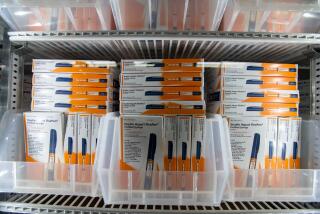Column: More on Mylan’s EpiPen profiteering: It allegedly ripped off Medicaid too
- Share via
Very quietly, on the Friday before a long federal holiday weekend, Mylan last week paid $465 million to stifle government allegations that it had systematically overcharged Medicaid for its notorious EpiPen medical device.
This sum is, amazingly, well more than twice the $185 million paid by Wells Fargo over charges that its bankers systematically ripped off and stole the identities of their clients, but it hasn’t received an iota of the attention of the Wells scandal. Let’s redress the balance just a bit.
You remember the EpiPen, don’t you? The device, which delivers a measured dose of epinephrine to stave off severe allergic reactions to food or insect bites, was the topic of a great deal of outrage a month or so ago because Mylan had jacked up the price of a two-pack to more than $600 from $100 in the few years since it acquired rights to the device.
It appears that Medicaid may have been grossly overpaying for EpiPen due to Mylan’s misclassification.
— Sen. Ron Wyden, D-Ore., and Rep Frank Pallone, D-N.J.
Mylan’s politically connected CEO, Heather Bresch, went before a congressional committee and essentially pleaded that the company had no option but to charge what the market would bear, even though that might place the life-saving device out of financial reach of many families. The company pledged to bring out a “generic” version of the EpiPen at about a 50% discount. It also expanded its program to cover the co-pay for the EpiPen for straitened families, although as we observed at the time, such “patient assistance programs” are themselves a drug-industry ripoff.
As we’ve also reported, the company also has exploited one of the more odious loopholes in the tax code, moving its putative corporate headquarters to the Netherlands in an “inversion” deal to reduce its U.S. taxes, even though it benefits hugely from U.S. legal protections and it continues to be run out of a suburb of Pittsburgh.
As is usually the case in these affairs, Mylan closed the books on its alleged Medicaid scam without admitting guilt. “The terms of the settlement do not provide for any finding of wrongdoing on the part of Mylan,” the company proclaimed in announcing the deal last Friday. The deal also forecloses rebate claims from the federal or any state governments, according to Mylan.
The alleged ripoff stems from Mylan’s classification of the EpiPen in selling it to Medicaid. As Andrew Slavitt, acting administrator of the program, explained it to Congress on Oct. 5, until 1997 the EpiPen was classified by its manufacturer — then Merck — as a brand name drug. Late that year, however, it was reclassified by the manufacturer as a generic drug. The difference was lucrative: Makers of brand drugs must give Medicaid a rebate of up to 23.1%, but generic drugmakers pay a rebate of only 13%. Brand drugs are also subject to an additional rebate when their price rises faster than inflation. That’s indisputably been the case with the EpiPen’s price.
“It appears that Medicaid may have been grossly overpaying for EpiPen due to Mylan’s misclassification,” Sen. Ron Wyden (D-Ore.) and Rep Frank Pallone (D-N.J.), ranking members of the Senate Finance Committee and House Energy and Commerce Committee, told Health and Human Services Secretary Sylvia Burwell in September.
By Medicaid’s standards, the reclassification is wrong. The EpiPen was approved by the FDA under a new drug application, has patent protection, and there are no competing FDA-approved devices, which are characteristics of brand drugs but not generics.
Mylan asserts that the EpiPen has been classified as a generic with Medicaid “based on longstanding written guidance from the federal government,” but Slavitt disputed that. Medicaid “has, on multiple occasions … expressly told Mylan that the product is incorrectly classified,” he told Wyden. Slavitt wouldn’t estimate how much Mylan saved in rebates after it acquired the EpiPen in 2007, but he did say that Medicaid had spent a total of $960 million on EpiPen purchases from 2011 through 2015.
The difference between a 13% rebate and 23.1% would be as much as about $100 million, depending on how the average manufacturer price is calculated — not counting the inflation rebate due on brand name drugs. The size of the settlement, however, suggests that the loss to Medicaid might be much higher. And there’s one more wrinkle: Myland won’t have start paying the higher rebate to Medicaid until April 1 — a six-month grace period that by one analyst’s judgment could be worth $120 million to the company.
For all that, Mylan has the right to claim that the settlement is good news. Bresch called it “another important step in Mylan’s efforts to move forward and bring resolution to all EpiPen Auto-Injector related matters.” Shareholders cheered. On Monday, the first trading day after the settlement announcement, the company’s stock rose more than 8%. That’s how getting off easy translates into real money.
Keep up to date with Michael Hiltzik. Follow @hiltzikm on Twitter, see his Facebook page, or email michael.hiltzik@latimes.com.
Return to Michael Hiltzik’s blog.
More to Read
Inside the business of entertainment
The Wide Shot brings you news, analysis and insights on everything from streaming wars to production — and what it all means for the future.
You may occasionally receive promotional content from the Los Angeles Times.











